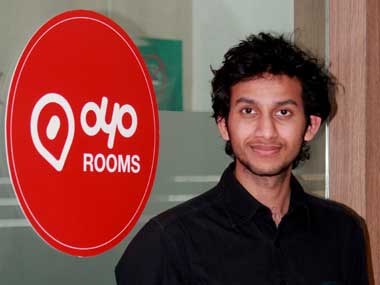The next company that is being greenlighted to enter the prestigious Unicorn club of startups is Oyo Rooms, a SoftBank-backed budget hotel aggregator. Founded by 21-year-old Ritesh Agarwal in 2015, the company is reportedly in talks with the Japanese SoftBank to raise about US $300-500 million. If this plan is successful, Oyo Rooms could be valued at US $1.2 billion which will ease it into the billion dollar unicorn club where it has for company Flipkart, ShopClues, One97 (Paytm), Ola and others, according to Economic Times.
This is interesting as the Indian startup story has been lackluster for some months now with a fund crunch squeezing dry many startups. It has led to many being shut down while some have cut down their workforce.
Over 200 startups shut down in 2016, according to data analytics firm, Tracxn. The number of startups that shut shop in 2016 was 50 percent higher than 2015, Tracxn data revealed. It said that seven out of the top 10 startups shut down after raising sizeable funds.
Another SoftBank-backed unicorn, Snapdeal was in the news last week for whittling down its staff strength by 600 employees. These were ‘hard decisions’ that needed to be taken on the journey towards profitability, said co-founders Kunal Bahal and Rohit Bansal, in an email to their employees.
The path to becoming a unicorn is strewn with challenges and more so after attaining that hallowed status. Just getting the valuation and funding is no guarantee that the status quo will remain. What is needed is a sustainable revenue model, which only a few startups have been able to follow to become successful.
The fact that someone is willing to fund the startup at its current valuation speaks volumes for it, says Harish HV, Partner, India Leadership Team, Grant Thornton India LLP.
Oyo Rooms raising funds from SoftBank is important in the current scenario though. “This proves that the India story is alive despite markdowns. Fundamentally, there is a growing market which is what investors are betting on,” says Paula Mariwala, Partner, Seedfund and Co-Founder, Stanford Angels.
On Oyo’s likelihood of becoming a unicorn, Sanchit Vir Gogia, Chief Analyst and Founder, Greyhound Research, said that it was for startups to share more tangible numbers like revenue, profits, cash flows, NPS among others. Other than being real, these numbers eloquently talk about the strengths (and weaknesses) of startups, he said. These are figures that most startups fight shy about and refuse to divulge.
If there is one thing that differentiates a unicorn from other startups, it is its business model, model for growth and not the funding or valuation per se, say analysts. Harish HV says that a Unicorn should not get deferential treatment just because it is a unicorn. Simply because, the business can still turn topsy turvy despite this well-earned label. And many are struggling to survive, leave alone becoming profitable after getting the unicorn status, he points out. “So why treat the unicorns differently,” Harish argues.
The unicorn status is not really the most important parameter - being on path to a sustainable, cash flow positive business model is, as that gives true independent life to business, adds Mariwala.
One of the early indicators of a company’s future growth is its employees. When employees are struck off the company’s rolls in large numbers, or if the top management quits, that is a clear indication that the company is floundering and wants to change the rule of the game to stay afloat and become leaner, meaner and be fund-ready, just in case it is able to get fresh funding. Or be willing for mergers and acquisitions.
If a company can take care of unit economics so that when it is ready to scale the former meshes well with the other, it is on a smooth path to growth, point out analysts.
Apoorv Ranjan Sharma, Co-Founder, Venture Catalysts, says that in 2016 the seed investment and innovation platform invested Rs 35 crore in 16 startup companies across geographies. It had five exits last year. Sharma, in his personal private capacity as an investor, has invested in 11 startups last year. He says that it is only a handful of companies that get these two ratios right – unit economics and scale working side by side, and can look forward to more funding.
That Oyo is in talks with Softbank to raise funds shows that Oyo is doing ‘very well’, said Sharma. In India, there have been companies that have failed after getting Series A and B funding. What is required is a sustainable matrix, else it is easy for these companies to be ‘ blown off’, he said.
There were eight unicorns from India in the global 107 firms list in 2016, according to Times of India. Of these eight companies, some are still struggling and a few have been blown away, said an analyst. “One of the big challenges is the sustainability matrix that the startups should focus on more so when they become unicorns,” said Sharma, because it is difficult to change the business model once a firm has becoming a unicorn.
Regarding players that fall off or call it quits like Chennai-based homestay and alternative stay aggregator Stayzilla did last week for instance, Sharma argues there cannot be more than one ‘best’ company in any sector. “One first rate company will have 90 percent of the business in the sector and whoever comes next can only be second best. At times, the latter entrant may crack the business code and make it big. However, until that happens, all the late comers in the sector can only be an extended second,” he said.
Unicorn is a label for those who have entered the $1 billon select category for startup business. To go further up this road, the founder/co-founders will have to strike it profitable, else the slide from this height can be faster.


)




)
)
)
)
)
)
)
)